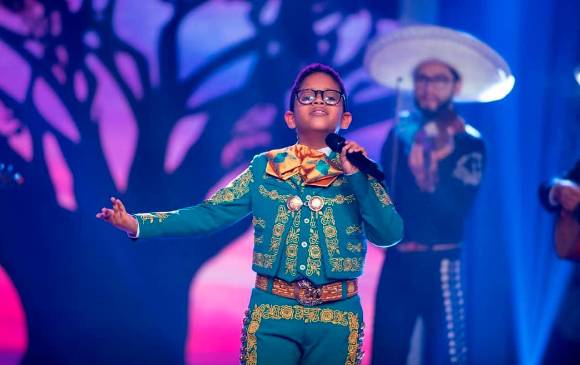Even Jesús Navarro, a jury for the La Voz Kids contest, is surprised by the number of children who sing rancheras and Mexican popular music in Colombia.
The vocalist of the group Reik says that more rancheras are sung in the country, especially children, than in Mexico itself, where this genre originates from.
This phenomenon is not exclusive to the 2021 edition of the popular television program (the most watched in Colombia), but is repeated year after year in La Voz, A Otro Nivel, Yo me llamo and Factor X, dedicated Colombian screen contests to the promotion of musical talents.
It is so much that the boom that in 2006 the winner of Factor XS was Andrés Hurtado, a 10-year-old boy, who, disguised as a mariachi and singing songs by Vicente Fernández, was the winner of that year.
“The love for Mexican music here is overwhelming, out of every five children, four are singing rancheras and traditional music, as well as popular Colombian songs; The children are very good, with voices that sound with power, and that caught my attention, because I expected to find more pop, ballad and rock, but I was surprised by how popular it was, ”says Spanish Natalia Jiménez, La Voz Kids jury . ”.
About this phenomenon, of children singing adult music, with lyrics and chords dedicated to spite, infidelity and heartbreak (unusual situations for minors), the producer and musician Daniel Escobar says that it is a song known as “ learn by imitation ”.
Escobar, who was a member of the group Suramérica and producer of J Balvin, explains that children learn what they hear at home.
“In some intermediate cities or in rural areas, popular music, understood as rancheras or parranda, is the one that is heard the most. My theory is that from there they start to try to imitate and develop a timbre and vibrato that almost only works for that genre. That’s where, in my concept, the abundance of rancheras comes from, but also a tone and a characteristic color of that genre in the voice of those children, ”Escobar comments.
In the same sense, Lulú Viera, from the Colegio de Música de Medellín and the renowned group Canto Alegre, says that this phenomenon is also known as the involuntary repertoire, which is what children hear in their daily lives, due to the influence of their parents, grandparents, caregivers, friends and more.
“Our position is not to fight against that repertoire, what we do as educators is to weigh that, we offer and show them other things, other rhythms and themes,” says Lulú, noting that she has noticed that the judges and the programs begin to recommend songs. more appropriate to their age, especially in thematic areas.
On how a child’s musical learning process should be, he explains that since Canto Alegre training, especially in the youngest ones, is based on quality children’s music, “which does not mean that everything is the chick or the little butterfly. It is talking about their universe, their imagination, friends, the planet, that this is the music that they sing “, explains the teacher who highlights that there are, for example,” beautiful songs from Disney movies and love songs in other ways, that can be explored ”.
This year in the Caracol program, 12,000 children participated in the virtual auditions (this time minors between 5 and 14 years old could participate), of which a pre-selection of 500 was made and to the auditions stage, which is the one that will be seen on the air, 117 arrived.
Andrés Cepeda, a jury for La Voz Kids and who has been in the different versions of the program since 2012, says that he personally gets very excited when children who sing Colombian music arrive.
“We have also found expressions of our country, children making vallenato, music from the plain, bambucos and corridors, in particular those are the genres that excite me the most, because seeing children so young that they continue to cultivate a music so much ours, that sometimes we think that it is from the past, and seeing them singing with that love is very exciting ”.

